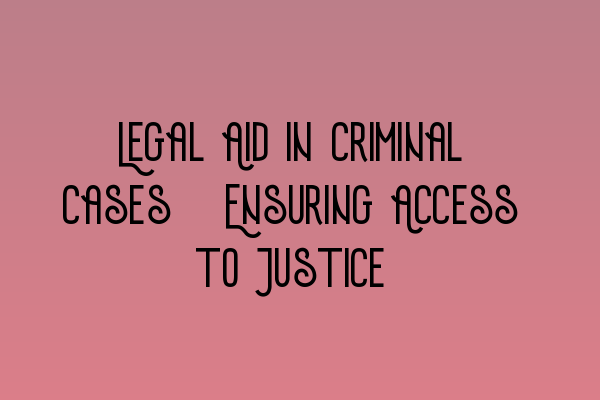Legal Aid in Criminal Cases: Ensuring Access to Justice
Legal aid plays a crucial role in ensuring access to justice for individuals involved in criminal cases. It provides financial assistance to those who cannot afford legal representation, allowing them to navigate the complex judicial system effectively. In this blog post, we will delve into the importance of legal aid and how it contributes to a fair and equitable criminal justice system.
The Importance of Legal Aid
Legal aid serves as a fundamental pillar of the justice system, ensuring that all individuals, regardless of their financial status, have access to legal representation. It provides a safety net for vulnerable and disadvantaged individuals who would otherwise be unable to afford legal services.
The provision of legal aid in criminal cases is particularly critical as it helps individuals understand their rights, navigate court proceedings, and present an effective defense. Without legal aid, the scales of justice would tip heavily in favor of those who can afford high-quality legal representation, leaving the less fortunate at a significant disadvantage.
By providing legal aid in criminal cases, society ensures that the accused receive a fair trial, preventing wrongful convictions and miscarriages of justice. It promotes equality before the law and upholds the principle that every person is entitled to a defense, regardless of their financial circumstances.
Challenges in Legal Aid Provision
Despite its importance, the provision of legal aid in criminal cases faces various challenges. Funding constraints have become a significant issue, with governments often struggling to allocate sufficient resources to meet the growing demand for legal aid services.
This lack of funding has led to restrictive eligibility criteria and limited availability of legal aid representation. Many individuals who may qualify for legal aid are often unable to access its benefits, further exacerbating the inequality within the justice system.
Furthermore, the remuneration rates for legal aid practitioners are often inadequate, discouraging experienced lawyers from taking on legal aid cases. This lack of experienced legal representation can significantly impact the quality of defense and the overall fairness of the criminal trial process.
Ensuring Access to Justice
To ensure access to justice in criminal cases, it is imperative to address these challenges and strengthen the provision of legal aid.
Firstly, governments must allocate sufficient funding to meet the demand for legal aid services. Adequate funding would allow for expanded eligibility criteria, ensuring that more individuals have access to legal aid representation when facing criminal charges.
Additionally, increasing the remuneration rates for legal aid practitioners would attract experienced lawyers to take on these cases. This would enhance the quality of defense and provide individuals with competent representation, regardless of their financial means.
Furthermore, raising awareness about the importance of legal aid is crucial. It is essential for individuals to understand their rights and the available options with legal aid. This can be done through educational initiatives, community outreach programs, and the dissemination of information through various channels.
In conclusion, legal aid plays a vital role in ensuring access to justice for individuals involved in criminal cases. It promotes fairness, equality, and upholds the principles of a just society. By addressing the challenges faced in legal aid provision, we can work towards a criminal justice system that is truly equitable and accessible to all.
Related Articles:
